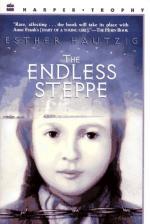|
This section contains 142 words (approx. 1 page at 300 words per page) |

|
Although Hautzig lived through a time of fierce oppression by both the Russians and the Nazis, her autobiography focuses more on childhood memories of life with her parents in Siberia than on descriptions of wartime brutality. Physical and emotional violence for example, are downplayed, as the reader only learns in a brief passage toward the end of the book that most of Esther's relatives in Poland were killed by the Nazis.
But this focus allows Hautzig to subtly raise questions about the inhumanity of war. Esther and her family are considered "enemies of the state" because of their economic status, and they are also the targets of anti-Semitic sentiments, but they combat this oppression by relying on their traditional family structure and faith. Hautzig's presentation of these issues is never offensive and instead encourages further research and discussion.
|
This section contains 142 words (approx. 1 page at 300 words per page) |

|




